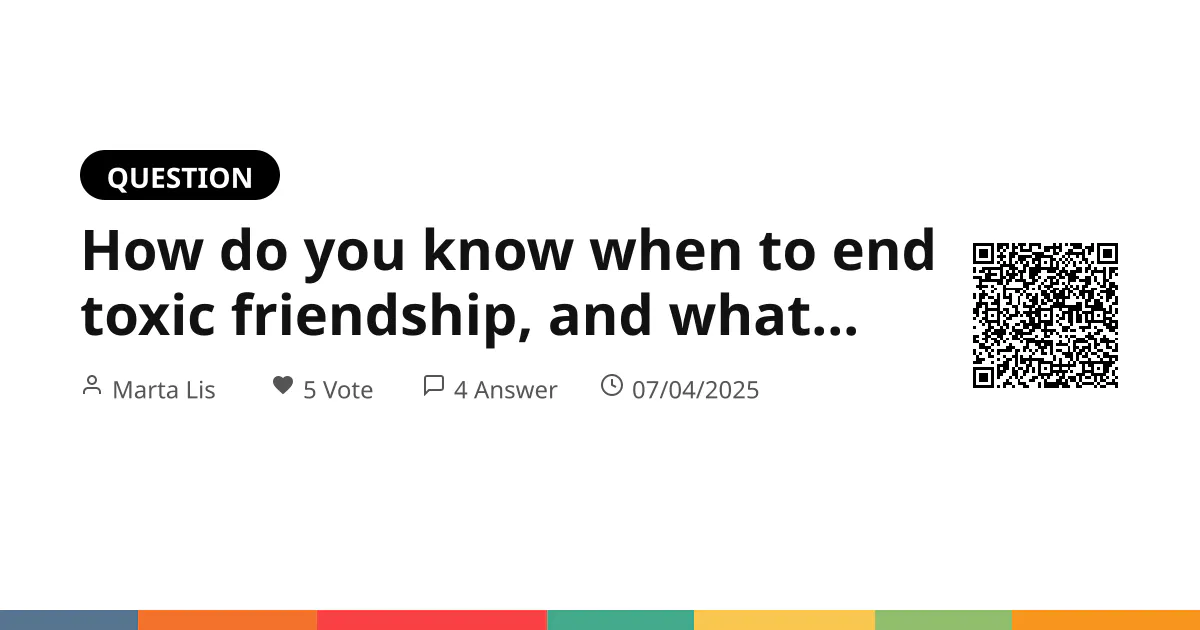
How do you know when to end a toxic friendship, and what's the least dramatic way to do it?
I have a friend I've known for over a decade. Lately, I've realized that I feel completely drained and anxious after almost every interaction with them. It's a lot of subtle digs, one-sided conversations where they only talk about their problems, and a general negativity that I absorb. I feel immense guilt about the idea of ending the friendship because of our long history.
How do you distinguish between a normal rough patch and a genuinely toxic friendship that's beyond repair? And if you do decide to end it, what is the kindest, most mature way to do a "friendship breakup" without causing a massive blowout or leaving them with a million questions?
4 Answers
Hi @Marta_Lis, your feelings are valid. The key indicator for me is the "post-hangout feeling." If you consistently leave interactions feeling emotionally exhausted, small, or anxious instead of uplifted, that's a huge red flag that the friendship has become toxic.
As for how to end it, there are two main paths depending on the level of toxicity and your desire for confrontation:
1. The Slow Fade (for less intense friendships): This involves gently and gradually reducing your availability. You take longer to reply to texts, you're "busy" more often when they ask to hang out. It's less direct but avoids a big confrontation. It works best if the friendship has already been drifting apart.
2. The Kind & Direct Conversation (for close, long-term friendships): This is harder but often more respectful. You can say something like, "I really value the history we have, but I've realized that our friendship isn't healthy for me anymore. I need to take some space for myself. I wish you all the best." Keep it focused on your needs ("I need..."), avoid blaming ("You always..."), and be firm but kind. You don't need to provide a long list of their flaws.
Before breaking up, consider setting a clear boundary as a final test. A toxic dynamic often thrives on a lack of personal boundaries.
For example, the next time they start making subtle digs, you could say calmly, "Hey, when you make comments like that, it's hurtful. I need you to stop."
Their reaction will tell you everything you need to know. If they get defensive, angry, or dismiss your feelings, you have your answer: the friendship is unsalvageable. If they apologize and make an effort to change (even if imperfectly), there might be hope. This way, you know you've given it a final, fair shot before you walk away.
Remember that "friendship" is a voluntary association. You do not owe anyone your time or emotional energy, regardless of history. The guilt you feel is a sign of your empathy, but it shouldn't be a cage.
Sometimes the kindest thing—to yourself—is to simply stop engaging. You don't need a formal breakup. Block their number if you have to. Mute them on social media. It might feel harsh, but if a person's presence in your life consistently harms your mental health, you have every right to remove that harm. Your peace is a priority.
I agree with the "slow fade" mentioned by @Lars_Eriksen, and want to add a detail: prepare a few neutral, non-debatable reasons for being busy.
Instead of a vague "I'm busy," try:
- "Sorry, I can't. I've got a family commitment that evening."
- "Thanks for the invite, but I'm swamped with a work project right now."
- "I'm focusing on my health and trying to have quieter evenings this month."